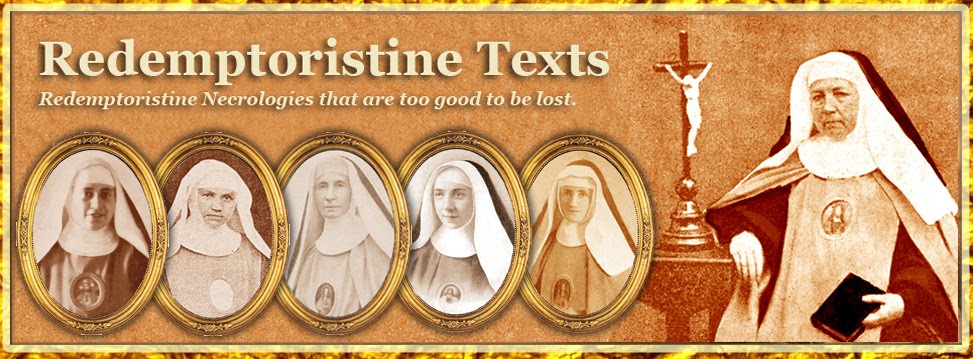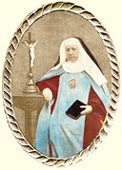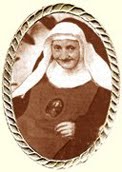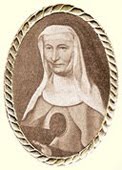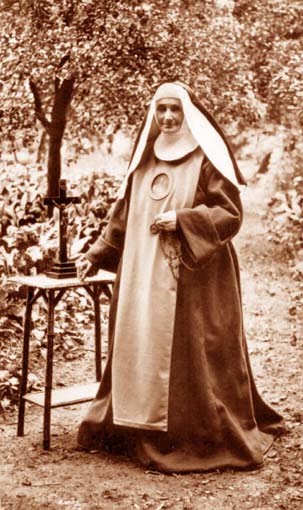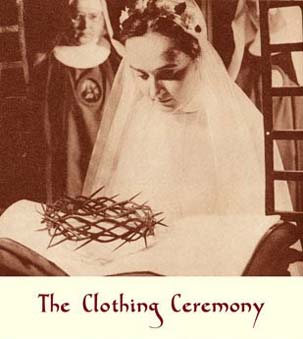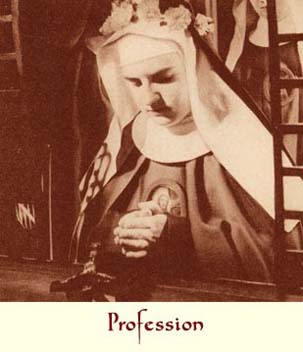Born Claire Verheyen
Sister Marie-Gabrielle was born on 26 May 1806 at Grave, in the Kingdom of Holland, then governed by King Louis Bonaparte, the brother of Napoleon 1st. Her parents occupied a very considerable position in the world. Her father was Secretary to the King, and later on, after the accession of the House of Orange, he was a member of the Senate.
Young Claire received a very careful education and was distinguished from her childhood by her goodness towards her inferiors. She had a very strong and educated spirit, and she felt herself soon drawn to the religious life after her years at boarding school. A general confession that she made to the famous Father Bernard, Redemptorist, was her deciding moment. But it was her own brother, Father Francis Verheyen, who caused her choice to fall on the daughters of Saint Alphonsus. He was himself a Redemptorist, and later became the Provincial of Belgium, England and Holland, and then Consulter General in Rome, where he died.
Claire had never heard the name of Saint Alphonsus mentioned! As soon as she heard it, she felt an extraordinary devotion to this great Saint, and the rest proved clearly that the holy Doctor wanted her as his Daughter. Although she was now thirty seven years old, she requested and obtained admission into the Monastery of Vienna, and entered there in 1844, but not without strong opposition on the part of her mother.
* * * * *
At Vienna, they soon saw that the new postulant would one day be one of the pillars of her Order. She was so well able to adapt herself to her new situation, the youth of her companions and the Austrian customs, so different from those of her own country, that they admired in her a brilliant victory of grace over nature, a spirit of childhood in the Gospel sense, a greatness and a strength of soul in every trial.
From that time on until her blessed demise, her favourite maxim was: “Give of yourself;” and also: “Everything for Jesus, nothing for me.” This firm resolution brought her through many things which, for others, would have been great sacrifices. “All of you are a cross,” she would sometimes say to other educandes. “For myself, I have none.”
Admitted to profession on 9th July 1845, she soon had the occasion to give unequivocal proof of her spirit of sacrifice. This happened first of all in the task of infirmarian, in regard to a Sister whose illness filled her with great repugnance. And then even more so, when the Revolution of 1848 forced her to go into hiding in the house of Baron Buhl, whose wife was a relative of one of the Sisters of Vienna. She was then forced to seek shelter at Cologne with the relatives of another Sister, and finally at Aix-la-Chapelle, in the Convent of the Sisters of Saint Elisabeth, where many Redemptoristines were reunited and where Sister Marie-Gabrielle, to her great stupefaction, was named Superior. Soon she moved on to Holland, where a little community had been established at Galoppe that later became the Monastery of Marienthal.[1]
In these temporary situations, she was distinguished by her love of suffering and regular observance. Although she had always been sickly since her entry into religion, the greatness of her soul gave her superior powers in all the difficulties, and she showed this especially when in 1860 she was elected Superior of the foundation, which had existed for only a few years. She often felt herself so weak that she feared that she would not be able to last until the end of the day. In the space of fourteen years, she suffered from a tumour on her knee without saying anything to anyone. To a wise severity for regular observance, she added so much goodness and kindness, and so much patience and solicitude, that she was dearly loved by all the Sisters both in her capacity as Superior and Mistress of Educandes and Novices, and also as Housekeeper in regard to the converse Sisters. To console tested and tempted souls, she did not hesitate to devote entire hours to them, and her efforts were most often crowned with success. As for the novices, she treated them very differently, according to their character and the degree of their virtue, reproving some of them for the slightest failings, and letting many things go with the others, and in this way she managed to gain all of them for Jesus Christ. Neglecting her own infirmities, she exhausted herself in her concern for the sick Sisters, and she went so far in her love of suffering that she would say: “A soul who loves God sincerely must desire the revolt of all her lower nature, in order to have the occasion to witness her fidelity to Him.”
We can summarize the interior life of this good Mother in just a few words: most of all she valued her quality of Bride of Jesus Christ, and her heart burnt with the most tender love for this divine Saviour. Just the words “Lord Jesus!” or “Everything for Jesus!” when she said them, gave this love an extraordinary efficacy. Her humility was no less. In a mass of things she recognized her own misery, and she took pleasure in accusing herself in the most humiliating manner. But she willingly forgot herself and thought continually of the needs of the Church. Her great soul needed to extend out to the needs of her divine Master and the penances that she imposed on herself in the chapters were most often prayers or mortifications to this end.
When her first triennium had ended, Sister Marie-Gabrielle of the Incarnation was named Admonitrix, and then re-elected unanimously as Superior. However, her infirmities got worse, and in 1868, she was forced to ask the Bishop of Roermond to be relieved of her duties. This she obtained, but instead of being free to take a much needed and well merited rest, she felt herself constrained (and this was the object of general admiration) to assist at Choir, even at the Great Matins, in spite of her extreme exhaustion. “Her great soul,” reads the Monastery Chronicle, “seemed to give her new strength at the thought that a Redemptoristine must be consumed entirely in the service of her heavenly Spouse.” She would very often say: “It would be shameful for us, if our zeal for the glory of God does not shorten our lives by ten years.”
Towards the end of this year of 1868, she started spitting up blood and this told the good Mother of the approach of death. She received the holy Viaticum on 18th October. In the midst of her atrocious sufferings, she was inspired to patience by this verse from the Gospels: “In patientia vestra possidebitis animas vestras.” [2] The blood that she coughed up in abundance she offered up for the holy Church, the conversion of England and other similar intentions. God in His turn loved to console His faithful servant. While during her life she had ordinarily been guided by her simple faith, in her last days she received some ineffable consolations, and the thought that she was dying as a Redemptoristine made her weep with happiness. Finally, on 12th November, she rendered her beautiful soul up to God.
Young Claire received a very careful education and was distinguished from her childhood by her goodness towards her inferiors. She had a very strong and educated spirit, and she felt herself soon drawn to the religious life after her years at boarding school. A general confession that she made to the famous Father Bernard, Redemptorist, was her deciding moment. But it was her own brother, Father Francis Verheyen, who caused her choice to fall on the daughters of Saint Alphonsus. He was himself a Redemptorist, and later became the Provincial of Belgium, England and Holland, and then Consulter General in Rome, where he died.
Claire had never heard the name of Saint Alphonsus mentioned! As soon as she heard it, she felt an extraordinary devotion to this great Saint, and the rest proved clearly that the holy Doctor wanted her as his Daughter. Although she was now thirty seven years old, she requested and obtained admission into the Monastery of Vienna, and entered there in 1844, but not without strong opposition on the part of her mother.
* * * * *
At Vienna, they soon saw that the new postulant would one day be one of the pillars of her Order. She was so well able to adapt herself to her new situation, the youth of her companions and the Austrian customs, so different from those of her own country, that they admired in her a brilliant victory of grace over nature, a spirit of childhood in the Gospel sense, a greatness and a strength of soul in every trial.
From that time on until her blessed demise, her favourite maxim was: “Give of yourself;” and also: “Everything for Jesus, nothing for me.” This firm resolution brought her through many things which, for others, would have been great sacrifices. “All of you are a cross,” she would sometimes say to other educandes. “For myself, I have none.”
Admitted to profession on 9th July 1845, she soon had the occasion to give unequivocal proof of her spirit of sacrifice. This happened first of all in the task of infirmarian, in regard to a Sister whose illness filled her with great repugnance. And then even more so, when the Revolution of 1848 forced her to go into hiding in the house of Baron Buhl, whose wife was a relative of one of the Sisters of Vienna. She was then forced to seek shelter at Cologne with the relatives of another Sister, and finally at Aix-la-Chapelle, in the Convent of the Sisters of Saint Elisabeth, where many Redemptoristines were reunited and where Sister Marie-Gabrielle, to her great stupefaction, was named Superior. Soon she moved on to Holland, where a little community had been established at Galoppe that later became the Monastery of Marienthal.[1]
In these temporary situations, she was distinguished by her love of suffering and regular observance. Although she had always been sickly since her entry into religion, the greatness of her soul gave her superior powers in all the difficulties, and she showed this especially when in 1860 she was elected Superior of the foundation, which had existed for only a few years. She often felt herself so weak that she feared that she would not be able to last until the end of the day. In the space of fourteen years, she suffered from a tumour on her knee without saying anything to anyone. To a wise severity for regular observance, she added so much goodness and kindness, and so much patience and solicitude, that she was dearly loved by all the Sisters both in her capacity as Superior and Mistress of Educandes and Novices, and also as Housekeeper in regard to the converse Sisters. To console tested and tempted souls, she did not hesitate to devote entire hours to them, and her efforts were most often crowned with success. As for the novices, she treated them very differently, according to their character and the degree of their virtue, reproving some of them for the slightest failings, and letting many things go with the others, and in this way she managed to gain all of them for Jesus Christ. Neglecting her own infirmities, she exhausted herself in her concern for the sick Sisters, and she went so far in her love of suffering that she would say: “A soul who loves God sincerely must desire the revolt of all her lower nature, in order to have the occasion to witness her fidelity to Him.”
We can summarize the interior life of this good Mother in just a few words: most of all she valued her quality of Bride of Jesus Christ, and her heart burnt with the most tender love for this divine Saviour. Just the words “Lord Jesus!” or “Everything for Jesus!” when she said them, gave this love an extraordinary efficacy. Her humility was no less. In a mass of things she recognized her own misery, and she took pleasure in accusing herself in the most humiliating manner. But she willingly forgot herself and thought continually of the needs of the Church. Her great soul needed to extend out to the needs of her divine Master and the penances that she imposed on herself in the chapters were most often prayers or mortifications to this end.
When her first triennium had ended, Sister Marie-Gabrielle of the Incarnation was named Admonitrix, and then re-elected unanimously as Superior. However, her infirmities got worse, and in 1868, she was forced to ask the Bishop of Roermond to be relieved of her duties. This she obtained, but instead of being free to take a much needed and well merited rest, she felt herself constrained (and this was the object of general admiration) to assist at Choir, even at the Great Matins, in spite of her extreme exhaustion. “Her great soul,” reads the Monastery Chronicle, “seemed to give her new strength at the thought that a Redemptoristine must be consumed entirely in the service of her heavenly Spouse.” She would very often say: “It would be shameful for us, if our zeal for the glory of God does not shorten our lives by ten years.”
Towards the end of this year of 1868, she started spitting up blood and this told the good Mother of the approach of death. She received the holy Viaticum on 18th October. In the midst of her atrocious sufferings, she was inspired to patience by this verse from the Gospels: “In patientia vestra possidebitis animas vestras.” [2] The blood that she coughed up in abundance she offered up for the holy Church, the conversion of England and other similar intentions. God in His turn loved to console His faithful servant. While during her life she had ordinarily been guided by her simple faith, in her last days she received some ineffable consolations, and the thought that she was dying as a Redemptoristine made her weep with happiness. Finally, on 12th November, she rendered her beautiful soul up to God.
Footnotes
[1] This Monastery was inaugurated on 26th June 1851, on the feast of the Sacred Heart of Jesus.
[2] “In your patience you shall possess your souls.”
This necrology is translated from Fleurs de l'Institut des Rédemptoristines by Mr John R. Bradbury. The copyright of this translation is the property of the Redemptoristine Nuns of Maitland, Australia. The integral version of the translated book will be posted here as the necrologies appear.
